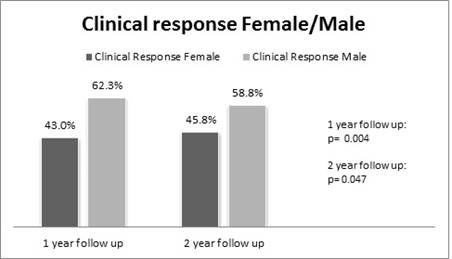Session Information
Session Type: ACR Poster Session B
Session Time: 9:00AM-11:00AM

Background/Purpose: Limited data is available on the influence of smoking, Body Mass Index (BMI) and gender on disease activity and response to TNF inhibitors in ankylosing spondylitis (AS). This study aims to determine whether these factors influence time of diagnosis, disease activity and response to TNF inhibitors.
Methods: In a prospective study, disease activity data (Ankylosing Spondylitis Disease Activity Score (ASDAS and BASDAI)) were collected from patients included in a real life observational cohort, who started or switched treatment TNF inhibitors. Data were collected at baseline, 6, 12 and 24 months. Independent T-tests and linear regression analyses were performed to assess the different factors their influence on time of diagnosis diagnosis and change in disease activity.
Results: In total 312 consecutive AS patients were included with a mean follow-up of 18.9 months. Most patients (172, 55%) showed improvement after the start of TNF inhibitors whereas, 86 patients (27.7%) had a clinically important improvement (i.e. decrease in ASDAS > 1.1) and 86 (27.7%) a major clinical improvement (decrease in ASDAS > 2.2). BMI was significantly correlated with time of diagnosis (p=0.016; 95%CI: 0.07 – 0.65): an increase of BMI with three points extended the AS diagnosis with one year. Smoking and gender were not correlated with the baseline ASDAS. BASDAI and BASMI at baseline were both influenced negatively by BMI. Gender was significantly associated with the clinical response (BASDAI50% or a 2 point decrease) to TNF treatment (p=0.041). More male patients showed clinical improvement on TNF treatment compared to female patients: at one year follow up 62.3% vs. 43.0 % and at two year follow 58.8% vs. 45.8% (figure1). Adjustment for BMI as confounder lead to a stronger statistical significance for gender difference in clinical response (p=0.022).
Conclusion: The most interesting finding was that females had a significantly lower clinical response to TNF treatment compared to males. Furthermore, high BMI not only extended the AS diagnosis up to one year, but also negatively influenced the BASDAI and BASMI scores. It seems that BMI and female gender are associated with clinical response to TNF treatment.
To cite this abstract in AMA style:
Rusman T, Nurmohamed M, van Denderen JC, Visman I, Van der Horst - Bruinsma IE. Female Gender Is Associated with a Poorer Response to TNF-Inhibitors in Ankylosing Spondylitis [abstract]. Arthritis Rheumatol. 2016; 68 (suppl 10). https://acrabstracts.org/abstract/female-gender-is-associated-with-a-poorer-response-to-tnf-inhibitors-in-ankylosing-spondylitis/. Accessed .« Back to 2016 ACR/ARHP Annual Meeting
ACR Meeting Abstracts - https://acrabstracts.org/abstract/female-gender-is-associated-with-a-poorer-response-to-tnf-inhibitors-in-ankylosing-spondylitis/
